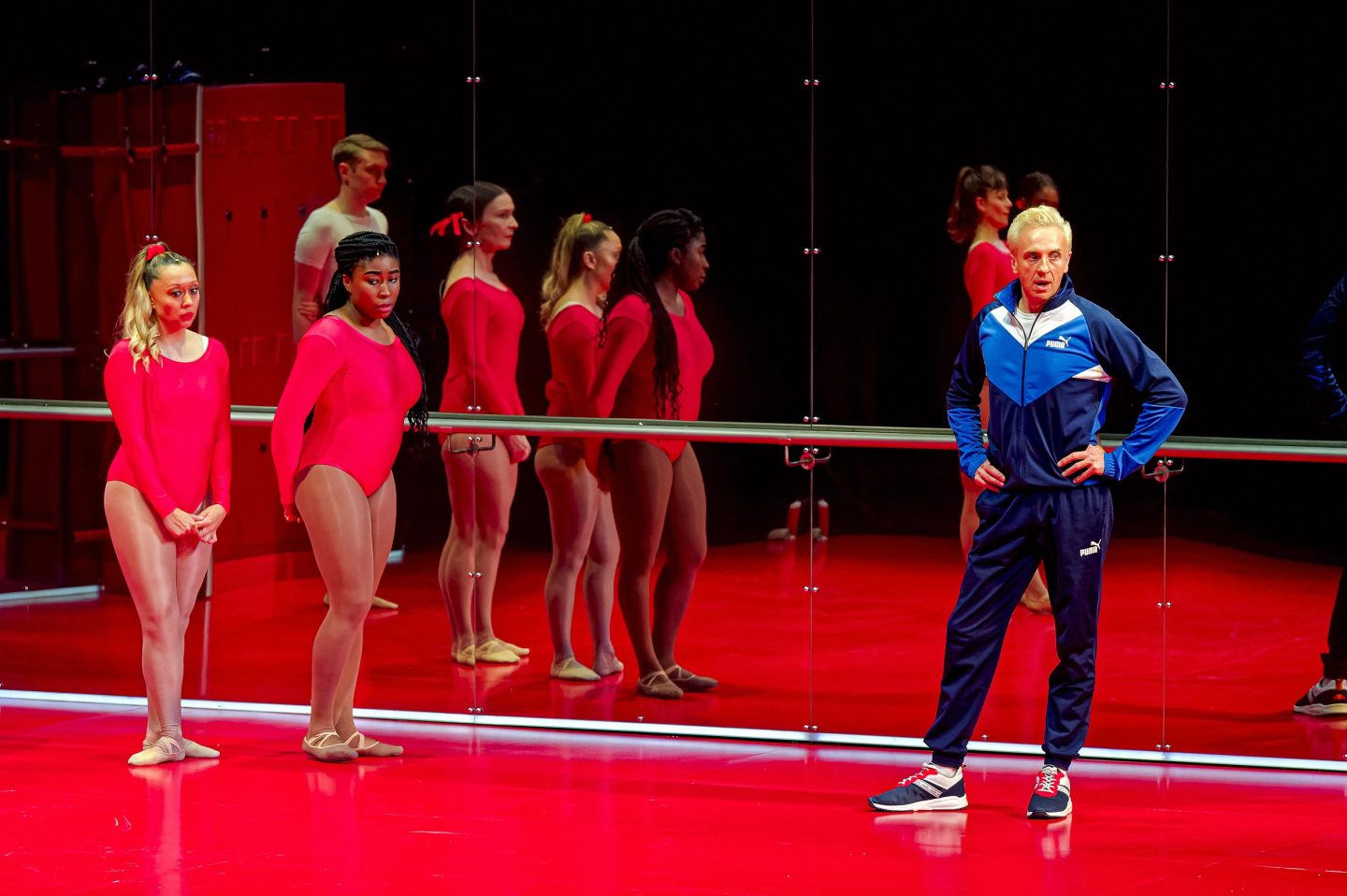We meet the 13-year-old dancers of Pat’s Dance Academy as they glide onto stage in formation, all shiny sailor suits, eerily unflinching smiles and lock-step choreography. Everything is nervously perfect, until the routine ends with a grotesque and Pythonesque comic shock. There’s blood on the dancefloor, and it won’t be the last time.
The troupe are on the cusp of an important competition, with a big new routine to master: an ‘acro-lyrical’ piece based on the life of Gandhi. It’s an absurd bit of shallow inspo-porn set to a perfectly ridiculous soundtrack, and while the team work towards the big day the question of who will take on a key solo sets the stage for internal division.
Between the group rehearsals and locker room chatter a series of one-on-one side conversations or soliloquys give a glimpse into the interior worlds of the girls (and token boy, played by The 39 Steps’ Tim Overton). Some are vague but pleasantly impressionistic, some hit hard, while others fall short of their expected destination. Comparisons to Rumpus Theatre’s recent production of Sarah DeLappe’s indoor soccer drama The Wolves are hard to avoid, and certainly Barron’s dialogue and character work rarely matches the naturalistic teenage patter of DeLappe’s soccer players.
But with the preteens played by a varied adult cast ranging from Sydney newcomer Chika Ikogwe and Victorian dancer/choreographer Yvette Lee to Strictly Ballroom star Tara Morice, realism is not exactly Barron’s primary goal. A watershed moment comes from Amber McMahon’s Ashlee, who reflects upon the emerging power of her pubescent body – her ass, her face, her brain – and how it is changing the way people, particularly men, act around her. But she also wonders why her involuntary response to attention or praise is self-deprecation, to reassure society that even if she does hold power she would never wield it – evoking the Chimamanda Ngozi Adichie line, “we teach girls to shrink themselves, to make themselves smaller”. Perhaps not coincidentally, the Beyoncé song that famously sampled the quote opened with a clip of an adolescent Knowles on a televised talent show.
 Yvette Lee, Chika Ikogwe and Mitchell Butel in Dance Nation
Yvette Lee, Chika Ikogwe and Mitchell Butel in Dance Nation
This incisively written and hilariously delivered monologue is among the play’s sharpest passages, with McMahon’s speech growing distorted and manipulated to evoke a kind of demonic possession – or Cate Blanchett’s dark Galadriel – as she comes to reckon with the power she holds. As things get real, Jonathan Oxlade’s mirrored dance studio set takes on a more ominous tone as red neon lights flicker and the whole set thrums to a brooding synthesiser score. It’s more Black Mirror than Dance Moms.
Despite the tracksuits, locker rooms and the perennially pacing coach, Barron relishes in subverting or ignoring the usual narrative tropes of the teen sports genre often seen onscreen. Early on Coach Pat (Mitchell Butel in his first onstage role with the company since taking over as artistic director) gathers the girls in a ritual worship of winning teams of decades past, with a framed photograph of a former star dancer at the top of the trophy cabinet. At the same time, Coach Pat notes that some of the girls will soon age out of the preteen category and be forced to start again at the bottom, underlining the Sisyphean nature of their task and impossibility of his expectations. It all recalls Netflix’s recent documentary series Cheer, where young men and women put themselves through physical and emotional wringers to excel in a sport that by its very definition has no future beyond their student years. Ultimately, the standards of excellence Coach Pat holds them to are pretty arbitrary and meaningless.
The likelihood of Coach Pat’s tough love approach having a big, emotive pay-off grow increasingly remote as he frames his coaching style as preparation for the harsh realities of the world. Unwittingly, he reflects a more accurate truth: the world is more often run on the arbitrary decisions, whims and contradictions of men in positions of power, even if it’s just over a group of tweens in a suburban dance studio.
A far more affecting scene comes when the team, in a moment of uncertainty before the big competition, feed off each other’s energy in an escalating chorus of foul-mouthed trash talk, or when the group are shown to be discovering their emergent sexuality under bright red lights and the sound of the Pussycat Dolls. Ultimately, it’s the girls who are the ones who will know their own power best – even if they don’t quite understand what it all means yet.
Later, Connie (Emma Harvie) reflects on how the physical intimacy of the girls doesn’t always translate to really knowing each other, and how the shape of their relationships will flow into their future lives – long after red tracksuits and choreography become a distant memory.
As the first entry in Butel’s first season as artistic director, it’s certainly one of the more out there plays State Theatre has mounted in recent memory, perhaps since another Belvoir co-production in 2017’s Mr Burns (A Post-Electric Play). Unsurprisingly, that play’s director Imara Savage once again steers the source material with a playful mix of colour and dark surrealism.
With a structure that deliberately, defiantly refuses to adopt a conventional arc, Dance Nation is a play dotted with key moments that feel extraordinarly vivid and prescient as they unfold, but ends up a blur of passion, turmoil and a bit of confusion. This might not be everybody’s cup of tea, but makes for a pretty fitting tribute to adolescence.
Dance Nation was performed at the Scott Theatre on Tuesday 25 February
Until 7 March
Adelaide Festival:
Dance Nation
Walter is a writer and editor living on Kaurna Country.
Related Article
Dance Nation brings the anarchy of adolescence to Adelaide Festival
Get the latest from The Adelaide Review in your inbox
Get the latest from The Adelaide Review in your inbox